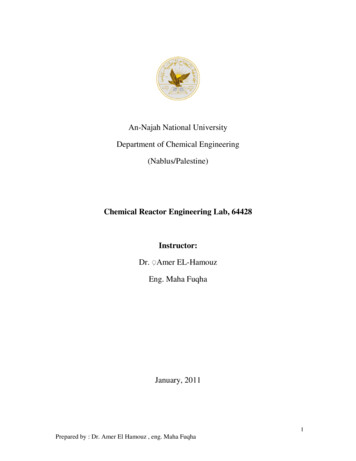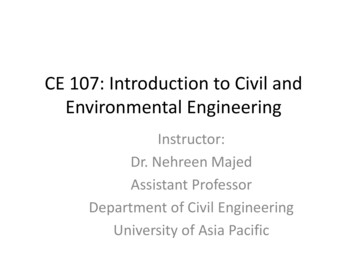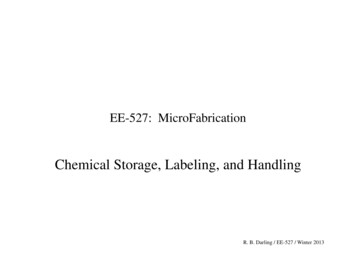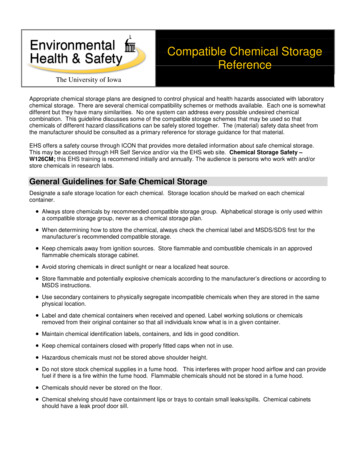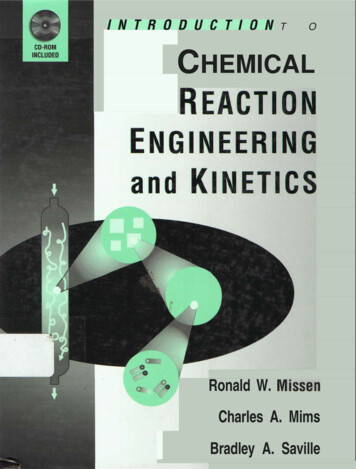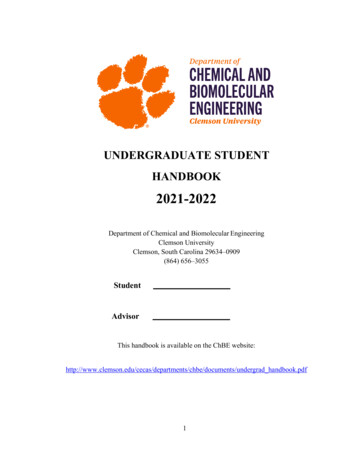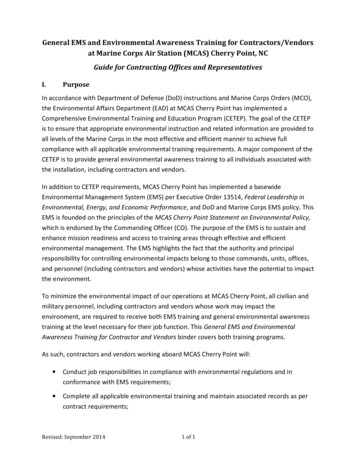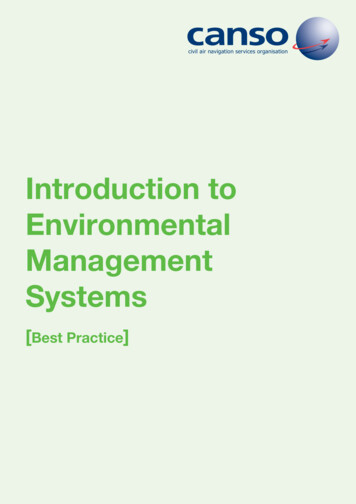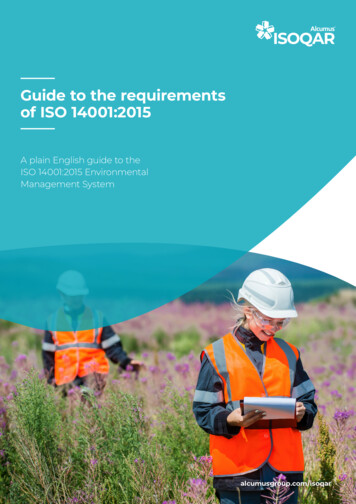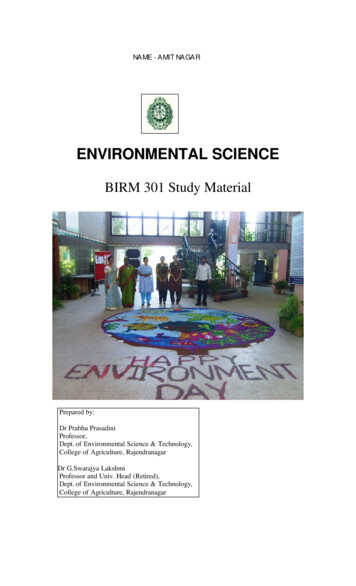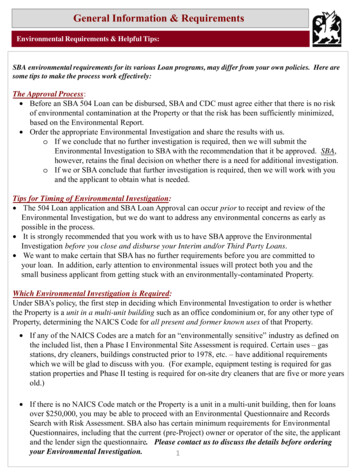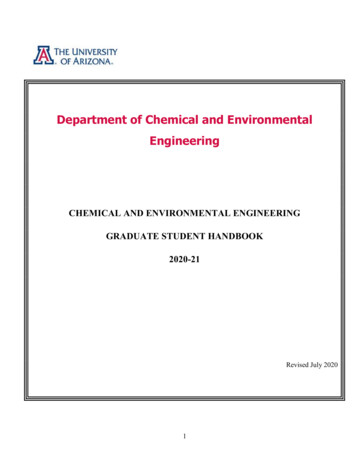
Transcription
Department of Chemical and EnvironmentalEngineeringCHEMICAL AND ENVIRONMENTAL ENGINEERINGGRADUATE STUDENT HANDBOOK2020-21Revised July 20201
TABLE OF CONTENTS1. Introduction . 42. General Program Information. 43. Information for New Students . 53.1 Assignment of Research Projects and Advisors . 53.2 Reassignment of Faculty Advisor . 63.3 Satisfactory Academic Progress . 73.4 Help with Academic Issues . 73.5 Safety Training. 73.6 University Policies . 73.7 Departmental Graduate Seminar . 83.8 Research and Teaching Assistantships and Other Funding Opportunities . 83.9 Other Resources . 103.10 Degree Requirements, Timelines and Deadlines . 103.11 Department Waivers and the Appeals Process . 113.12 CHEE Incomplete Policy . 123.13 Annual Evaluation . 123.14 Transitioning from MS to PhD or adding an MS to a PhD program . 123.15 Graduate Student Academic Grievance Procedures . 133.16 International Student Requirements and Resources . 134.0 Degree Requirements: Chemical Engineering . 144.1 PhD Program (Chemical Engineering) . 154.2 MS Program (Chemical Engineering) . 244.3 Accelerated MS Program (AMP Chemical Engineering) . 294.4 Minor in Chemical Engineering. 375.0 Degree Requirements: Environmental Engineering. 395.1 PhD Program (Environmental Engineering) . 405.2 MS Program (Environmental Engineering) . 482
5.3 Accelerated MS Program (AMP Environmental Engineering) . 515.4 Minor in Environmental Engineering . 57APPENDIX . 58A1. Chemical & Environmental Engineering Faculty and Staff . 58A2. Graduate Studies Committees . 59A3. MS Non-thesis Checklist . 60A4. MS Thesis Checklist . 61A5. PhD Checklist . 62A6. Chemical and Environmental Engineering Advisor Selection Form . 63A7. Dissertation Committee Review Form (ChE only) . 64A8. PhD Publications Form . 65A9. Graduate Student Department Petition . 66A10. Chemical and Environmental Engineering Defense Evaluation Rubric (MS) . 67A11. Chemical and Environmental Engineering Defense Evaluation Rubric (PhD) . 683
General Information1. IntroductionThis Graduate Handbook is intended to help you on your path through the Department of Chemical andEnvironmental Engineering’s (the Department) advanced degree programs and on to future career success.Here you will find information and guidance from the time you arrive until you become one of our manyoutstanding graduates. We strongly recommend that you review the entire document now and ask questionsabout it. Please be aware that the handbook is likely to be updated each year and that those revisions may beimportant to you. You should also become familiar with the information provided on the University of Arizona(UA) Graduate College website: http://grad.arizona.edu/. Specifically, general information about nonacademic resources for graduate students can be found at: . General Program InformationThe Department offers the following advanced degrees in both Chemical Engineering (ChE) andEnvironmental Engineering (EnE): Master of Science (MS) with and without a thesis (MS Thesis and MS NonThesis), and the Doctor of Philosophy (PhD). Both programs also offer an Accelerated Master’s Program(AMP) leading to an MS Non-Thesis or MS Thesis degree. Students in the MS Non-Thesis degree programwill broaden their knowledge in their chosen discipline, and by selecting the MS Thesis program, students willcomplete a research project working in close collaboration with a faculty member. Students choosing the PhDdegree will be trained to do independent and original research.Graduates of each of these degree programs will be trained to be leaders in industry, academia, nationallaboratories, or consulting. CHEE graduates are represented in organizations such as Intel, GlobalFoundries,Micron, Cabot Microelectronics, NXP Semiconductors, Arizona State University, and more. Upon graduation,students will be well-prepared to assume positions in a variety of topics due to the diversity of the knowledgegained in the two CHEE degree programs, with the environmental focus leading to more environmentallyrelevant positions.4
New Student Information3. Information for New Students3.1 Assignment of Research Projects and AdvisorsThe MS and PhD degrees are primarily research degrees. Consequently, one of the most important objectivesfor entering graduate students is to participate in the processes for determining your research topic andadvisor(s). Developing and maintaining an early working relationship with an advisor, who is responsible formentoring, is extremely important.Students who have a research assistantship will typically have an advisor before the semester begins. Selfsupported students or students with fellowship support, if without an advisor at the beginning of their firstsemester, must meet with all faculty members that have available research projects during their first two weeksof classes. All meetings with faculty regarding research should be completed within the first two weeks afterarrival at the University of Arizona.After completing these steps, and no later than the Friday of the third week of classes, a new student shouldindicate their first, second, and third choices for a faculty advisor on the Chemical and EnvironmentalEngineering Advisor Selection Form (see Appendix A6 of this handbook). This form must be submitted to thechair of their respective Chemical Engineering or Environmental Engineering Graduate Studies Committee(GSC) with a copy to Grace Fuller (gracefuller@arizona.edu), the graduate program coordinator. Even if astudent has a faculty advisor before the semester begins, the student must complete the form with the name oftheir faculty advisor and submit it to their respective GSC chair and the graduate program coordinator.The GSCs for both Chemical Engineering and Environmental Engineering oversee the project requests byincoming students for the respective degree programs. Final assignment of students to projects and researchadvisor(s) is made for all degree programs by the GSCs and the department chair based on student preferences(see Appendix A6), availability of funding, and balance in accordance with the research objectives of thedepartment. Please see the department chair if you have any questions during these processes.Students who do not complete these explicit processes for project and advisor selection on time must meetwith the GSC for their respective program to discuss the issue. This meeting will take place before the end ofthe Fall semester of the first year of study and will be set up jointly with the GSC and the student. Without acompelling extension request (see Section 3.11 herein), the GSC will ask the Graduate College to remove astudent who has not obtained an advisor by the end of the first semester.5
New Student Information3.2 Reassignment of Faculty AdvisorAlthough the situation is extremely rare, the department realizes that it is sometimes in the best interest of thestudent to switch advisors. In such cases, ethical behavior requires that both the student and the new advisorconsult with the first faculty advisor before making any such change. To change advisors, the student mustobtain approval of the primary faculty advisor or the Director of Graduate Studies for the relevant program(ChE or EnE). Once the approval is obtained, the student will do one of the following:MS Student1. If the student has not already completed a Plan of Study, then the student will simply list the newfaculty advisor on the Plan of Study at such time as it is submitted to the Graduate College.2. If the student has already completed a Plan of Study in GradPath, then the student will submit a newPlan of Study with the new advisor listed.PhD Student1. If the student has not already completed a Plan of Study, then the student will simply list the newfaculty advisor on the Plan of Study at such time as it is submitted to the Graduate College.2. If the student has completed a Plan of Study but has not completed the Comp Exam CommitteeAppointment form in GradPath, the student must submit a new Plan of Study with the new advisorlisted.3. If the student has completed the Comp Exam Committee Appointment form in GradPath but has notcompleted the Oral Comprehensive Exam, then the student must submit a new Comp ExamCommittee Appointment form listing the new advisor as the Chair of the Comprehensive ExamCommittee.4. If the student has completed the Doctoral Comprehensive Exam, then the student will list the newadvisor as the Chair of the Doctoral Dissertation Committee on the dissertation committeeappointment form in GradPath.In the event that a faculty advisor determines that it is in the best interest of a student to be removed from theadvisor’s research group, then that faculty advisor shall consult with the program’s Graduate StudiesCommittee members to determine best steps for removing and reassigning the student.6
New Student Information3.3 Satisfactory Academic ProgressA high level of performance is expected of all students in the CHEE graduate degree programs. Students mustmaintain a minimum of a 3.0 cumulative GPA throughout the program and must consult with both their facultyadvisor and the graduate program coordinator to discuss issues pertaining to unsatisfactory progress, ies/academic-probation) such as a GPA below 3.0 at the end of a given semester. Students failing to meetGPA requirements will be placed on probation by the Graduate College for one semester. If the cumulativeGPA is not raised to the required minimum in the following semester, the student’s faculty advisor and therelevant graduate studies committee will decide whether to: (1) academically disqualify the student from theprogram; or (2) with Graduate College approval, allow the student to continue on probation upon approval ofa remediation plan. The student is expected to work with the student’s faculty advisor and the graduate programcoordinator to improve the student’s academic standing.3.4 Help with Academic IssuesIn most circumstances, graduate students should first pose questions on academic matters to their facultyadvisor. Other members of their thesis or dissertation committee should also provide guidance and mentoring.The Graduate Studies Committees can help with advice, especially on curriculum questions and deadlines.Students may also contact the department chair at any time concerning issues related to their graduate studies.3.5 Safety TrainingAll entering graduate students are required to take safety training. THIS IS REQUIRED PRIOR TOWORKING ON ANY PROJECT. The safety training is available online through Desire2Learn (D2L).Students must submit an electronic copy of their completion certificate to their faculty advisor and to thegraduate program coordinator, Grace Fuller (gracefuller@arizona.edu), upon completion of the course.3.6 University PoliciesStudents are responsible for being aware of the policies described at the following websites pertaining toacademic conduct, conduct of research, and general student conduct. Academic Integrity: tegrity Responsible Conduct of Research: http://www.orcr.arizona.edu Student Conduct: Student%20Code%20of%20Conduct.pdf7
New Student Information Graduate Policies and Procedures: https://grad.arizona.edu/policies3.7 Departmental Graduate SeminarAll full-time graduate students enrolled in the chemical engineering or environmental engineering graduateprograms are required to register for 1 seminar unit (CHEE 696A) and attend the departmental seminar orcolloquium each semester unless it conflicts with another required course. (Enrollment will not be waivedfor conflicting elective courses.) In rare instances, a student may obtain permission to enroll in both CHEE696A and a concurrent course (see Section 3.11 herein regarding waivers), but the student must log in to viewthe Zoom recording of the seminar each week and complete the assignments on time. CHEE 696A is requiredeven if the student has satisfied the seminar requirements for their degree.3.8 Research and Teaching Assistantships and Other Funding OpportunitiesTeaching and research assistantships, traineeships, and fellowships provide the most common forms of supportfor graduate students. Assistantships at 0.50 full time equivalent (FTE) or higher include a stipend, healthinsurance, and full tuition. Assistantships at less than 0.50 FTE include a stipend, health insurance, out-of-statetuition, and 50% of in-state tuition: ources/employment/GA.Research assistantships (RAs) are awarded to graduate students by faculty advisors and funded by the facultyadvisor’s research program. Priority is given to PhD candidates. RA contracts may be for 0.25 FTE, 0.33 FTE,or 0.50 FTE. The faculty advisor is responsible for supervising RAs whom they employ.Teaching assistantships (TAs) are awarded/assigned by the GSC each semester. Priority is given to 2nd–5th yearPhD students. Note that it is strongly recommended that all PhD students TA at least one semester duringpursuit of their degree. All students must have the appropriate background for the course for which they willTA (e.g., they have taken an equivalent course as an undergraduate), and they must pass the Graduate College’sTeaching Assistant Online Training and Orientation (TATO) test. TA and grader position descriptions typicallyare provided to all graduate students during the semester preceding the semester where the TA or grader isneeded. Interested students must submit a resume to the graduate program coordinator and indicate whichposition interests them. The TA positions consist of academic training intended to provide the student with theopportunity to participate in the education of undergraduate students. Duties may include conductinglaboratory and discussion sessions and holding office hours. FERPA training is required for all TA positions.Further information regarding FERPA requirements can be found at: http://registrar.arizona.edu/personal-8
New Student Informationinformation/ferpa-tutorial. TAs are supervised and reviewed by their assigned course instructors. The reviewprocess is mandatory and provides constructive feedback for the TAs.Out-of-state tuition is waived with all RA and TA contracts.RAs and TAs receive partial or full in-state tuition coverage as part of their employment benefit as follows:0.25 FTE: 50% in-state tuition covered0.33 FTE: 50% in-state tuition covered0.50 FTE: 100% in-state tuition coveredStudents awarded less than 0.50 FTE are responsible for payment of 50% of their in-state tuition. For lator.fso.arizona.edu.Students who are awarded TA/RA positions will receive an offer letter outlining their specific funding,including tuition coverage at 50% or 100%, prior to the beginning of the semester in which they will serve asa TA/RA. One important requirement prior to serving as a TA/RA is to complete online training in Title ning).Graders are hired as needed for core chemical engineering and environmental engineering courses. PhD andMS students with appropriate background for the course are eligible to apply for grader positions. Graders arehired on an hourly basis for no more than 5 hours per week during the semester. There is no tuition coverageor health insurance benefits with grader contracts.Graduate students may seek additional funding opportunities announced by the UA Graduate College. Adetailed listing is available at: https://grad.arizona.edu/funding/opportunities. Graduate students seekingfunding for their studies or research can also find helpful information through the Office of Fellowships andCommunity Engagement. Many other funding resources are available to UA students through ScholarshipUniverse. The Graduate and Professional Student Council (GPSC) also has funding opportunities athttps://gpsc.arizona.edu/grantsawards.One of the scholarships that may be given by the UA Graduate College is the Thesis & Dissertation TuitionScholarship for non-resident students who are within two years of completing their degrees and are taking only9
New Student Information900-level graduate courses. The scholarship can reduce tuition for these students to the in-state residentamount. If you are interested in taking advantage of this scholarship, please contact Grace Fuller(gracefuller@arizona.edu), the graduate program coordinator, as it requires a department nomination.3.9 Other ResourcesThe Graduate College offers students a number of resources for parents, for professional development, forhealth and wellness, and more. Information on the many resources available can be found s.3.10 Degree Requirements, Timelines and DeadlinesThere are five graduate degrees offered by the Department of Chemical and Environmental Engineering: PhDin Chemical Engineering, MS in Chemical Engineering, PhD in Environmental Engineering, MS inEnvironmental Engineering and, beginning in 2021-22, an ME in Environmental Engineering. Subsequentsections describe the particular requirements for each of the first four degree paths. The student’s facultyadvisor, other members of their committee, the members of the graduate studies committees, and the staffgraduate program coordinator are all sources of additional information regarding the department’s degreerequirements and deadlines. The staff graduate program coordinator is probably the student’s most reliablesource. The graduate program coordinator helps the student navigate required forms, timelines and deadlinesso that the student can graduate on time. There are degree checklists in the Appendices (A3 A5) of thishandbook that students should review and keep with them during their full period of study to make sure theyare on track.Graduate studies milestones indicating the semesters in which certain administrative steps should take place inorder to meet satisfactory progress towards completion of degree requirements are highlighted in yellow onthe many Sample Plans provided in the following sections of this handbook. These steps includecomprehensive exams, submission of research proposals, and timely filing of required forms (e.g., plan ofstudy, committee appointments, etc.).The graduate program coordinator reviews student progress regularly andwill often provide reminders to students who have fallen behind on progress, but it is still the student’sresponsibility to be aware of and adhere to the degree requirements, timelines and deadlines required for theirdegree. Students who fail to make satisfactory academic or research progress will be notified in writing of theirstatus. They will be asked to develop and submit a remediation plan signed by their faculty advisor. It is in thebest interest of both the students and the Department of Chemical and Environmental Engineering for degrees10
New Student Informationto be earned in a timely manner. MS students who have not completed degree requirements within 4 years, orPhD students who have not completed degrees within 6 years will receive a letter strongly encouraging themto complete all degree requirements within 1 year (with a copy to the Graduate College). Students who fail tomeet this deadline will be sent another letter (with a copy to the Graduate College) and will be required tosubmit a letter requesting and justifying a time extension to the relevant graduate studies committee (with acopy to the graduate program coordinator) no later than 1 month after receipt of the CHEE letter. A letter ofendorsement from the faculty advisor and the student’s advisory committee (whether thesis or dissertation)must accompany the student’s letter of request. This process can be repeated once more before the student isjudged to be in noncompliance with timely progress. If extreme extenuating circumstances prevent a studentin good standing (e.g., GPA 3.0) from completing the degree requirements within the year, a leave of absencemay be requested. Students who fail to complete requirements and fail to submit a letter requesting a timeextension will be judged to be in chronic non-compliance, and the Graduate College will be asked to dismissthe student from the CHEE program. Dismissed students are eligible to reapply to the program; however,reapplication does not guarantee readmission.Specific information about steps to the degree can be obtained from the Graduate College website, whichincludes a list of official requirements, deadlines and procedures. Students must follow the specific instructionsprovided at the following links: u/gsas/degree-requirementsAll PhD and MS students must submit GradPath forms to the Graduate College electronically. Students mustreview the Graduate College information carefully and be cognizant of deadlines. From the website listed inthe second bullet above, students can navigate to find the following two links that provide importantinformation about dates/deadlines, as well as find resources for parents, professional development, andhealth/wellness: http://grad.arizona.edu/new-and-current-students mportant-degree-dates-and-deadlines3.11 Department Waivers and the Appeals ProcessAny student who wishes to request a departmental waiver for any of the department’s degree requirements, foreither MS or PhD degrees, must complete a Graduate Student Department Petition (see Appendix A9) and11
New Student Informationsubmit it to the appropriate Graduate Studies Committee Chair. The request will be reviewed by the program’sGraduate Studies Committee. The request must be supported by a compelling case or the petition will bedenied. Additional pages can be attached and submitted with the petition, if necessary. NOTE: The petitionmust be submitted in the semester for which a change is being requested or it will be automatically denied. Astudent who is denied a waiver may, at the discretion of the student and with the support of the student’s facultyadvisor, appeal to the Department Chair for additional review of the case. Weighing discussions with thestudent, the student’s faculty advisor and the relevant Graduate Studies Committee members, the decision ofthe Department Chair will be considered final.3.12 CHEE Incomplete PolicyStudents earning a grade of Incomplete, “I,” for a course must submit a completed Report of Incomplete Gradeform to the CHEE graduate program coordinator for inclusion in their academic record. Incomplete gradesshould be completed in a timely manner and are submitted at the discretion of the course instructor. AnyIncomplete grade must be completed no later than one year from the last day of the term of the course forwhich the student received the incomplete unless a one-year extension has been approved by the student’sinstructor and the Graduate College dean prior to the one-year deadline.3.13 Annual EvaluationAll CHEE graduate students will be evaluated at least annually with regard to satisfactory progress towardcompleting their degree requirements. TAs and RAs will receive official performance reviews, copies of whichwill be filed with the department through the Graduate Program Coordinator.3.14 Transitioning from MS to PhD or adding an MS to a PhD programOn the advice of the student’s faculty advisor, a master’s student who is in good academic standing (GPA of3.0 or higher) may transition to pursue a PhD. The student must apply and be accepted to the doctoral programthrough GradApp (and pay the application fee). It is strongly suggested that the faculty advisor be selected asa reference for the PhD application. The reference letters used for the master’s application may also apply tothe PhD, but the applicant will need to see Grace Fuller (gracefuller@arizona.edu), the graduate programcoordinator, for information on how to navigate the application form to satisfy the references requirement.Students who transition from the MS program to the PhD program are expected to take the Qualifying andComprehensive Examinations on the same schedule as if their first day in the MS program was their first dayin the PhD program. If the student transitioning to the PhD has a GPA of 3.75 or greater in their program’s12
New Student Informationcore courses, they will be exempt from taking the Qualifying Exam. If the student transitioning to the PhD hasa GPA below 3.75 in their program’s core courses, the student must take the exam on the next available examdate after having completed the core courses. See Sections 4.1.4 (Chemical Engineering) and 5.1.3(Environmental Engineering) for additional details.A student may also determine, upon the advice of the student’s faculty advisor, to add an MS degree in thestudent’s same respective program to the student’s PhD program. To add the MS to the PhD program, thestudent must complete a Change of Program Form to be signed by the student and the program’s GraduateStudies Chair. The completed form must be submitted via email to the CHEE degree counselor at the GraduateCollege. Grace Fuller (gracefuller@arizona.edu) can provide a copy of the form to the student. The studentdoes not need to apply for the MS or pay an application fee.3.15 Graduate Student Academic Grievance ProceduresA student with any type of grievance should first communicate with their graduate research advisor or chair ofthe Graduate Studies Committee, based on which is more appropriate in the student’s view based on the matterat hand. This process aims to resolve grievances informally within the department. When issues cannot beresolved informally, the graduate student is encourag
The Department offers the following advanced degrees in both Chemical Engineering (ChE) and Environmental Engineering (EnE): Master of Science (M S) with and without a thesis (MS Thesis and MS Non-Thesis), and the Doctor of Philosophy (PhD). Both programs also offer an Accelerated Master's Program
